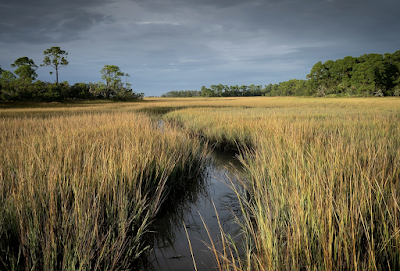 |
| South Carolina's St. Helena Island offers a glimpse into our country's crop heritage. (Photo by David McLain, National Geographic) |
Carolina Gold is "a unique heirloom grain. A West African strain, it was first grown, cultivated, and cooked on American soil by enslaved peoples on plantations," Buettner writes. "In the 19th century, it became the dominant rice in the U.S. market, only to all but completely disappear after the Great Depression. Though you couldn’t find it on grocery store shelves for decades, it was legendary in the Low Country for its unique starchiness and earthy, nutty flavor."
BJ Dennis, a South Carolina chef, told Buettner he was on a mission to bring back
the cuisine
of his rice-growing ancestors. “We took the rustic soul of the Africans
and the Native American techniques and made this special mash-up,” Dennis
told Buettner. "The resulting cuisine is uniquely American, explosively
delicious, and as I’ve been discovering, it draws from ingredients that
support longevity."
In Savannah, Georgia, Buettner met "Roosevelt Brownlee, a 75-year-old dreadlocked Gullah chef who has cooked for the likes of Stan Getz and Nina Simone," Buettner reports. "In a backwoods kitchen, he and his cousin Rollen Chalmers whip up 'pink-eyed soup,' hoecakes and red peas—all accompanied by Carolina Gold cracked rice. As his T-shirt proclaims, 'Rice Is Life.'"
Thanks to the efforts of people Dennis and Chalmers, Buettner writes, "You can now find Carolina Gold rice again on grocery store shelves and online."
No comments:
Post a Comment